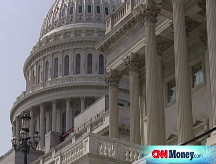Stocks rise on Fed
Investors breathe a sigh of relief that the central bank's outlook was not more bearish. After the close, AIG plummets.

NEW YORK (CNNMoney.com) -- Stocks rallied Tuesday as investors focused on the positive implications for the economy in the Federal Reserve's decision to hold interest rates steady, and on diminishing fears about AIG's solvency.
The Dow Jones industrial average (INDU) gained 1.3%. The Dow had fallen to a fresh bear market trading low of 10,742.70 in the morning before bouncing back.
The Standard & Poor's 500 (SPX) index gained 1.8% and the Nasdaq composite (COMP) added 1.3%.
After the close however, AIG shares tumbled around 50% on a report that the government is considering conservatorship as a means of rescuing the troubled insurer. The government put Fannie Mae and Freddie Mac in conservatorships earlier this month, enabling it to oversee operations and protect the assets of the two mortgage lenders.
Following the reports, AIG issued a statement saying that its life insurance, general insurance and retirement services businesses are operating normally. The insurer reiterated that it continues to look for means of raising capital to address what it says are short-term liquidity issues.
Also after the close, reports said that Barclay's has agreed to buy some of the investment banking and trading operations of Lehman Brothers, which declared bankruptcy on Monday after failing to find a buyer. Lehman (LEH, Fortune 500) shares gained 43% during the regular session.
Additionally, Morgan Stanley reported better-than-expected third-quarter sales and earnings after the close Tuesday, one day ahead of schedule.
Tuesday's market: Stocks seesawed throughout the session as investors considered the prospects for AIG, the world's largest insurer. The company has seen its stock price and investor confidence plummet as it has struggled to raise cash amid the credit market fallout. Reports that the Treasury could step in helped the stock trim morning losses and gave the market a leg up.
Also helping Wall Street Tuesday: an ultimately positive reaction to the Fed's decision to hold the fed funds rate, a key short-term interest rate, steady at 2% - and not signal worsening conditions in its statement. Stock investors initially took a knee-jerk negative reaction to the Fed, before taking a more sanguine response.
Although a cut to the fed funds rate might have provided a psychological boost, the central bank is already providing a lot of liquidity to Wall Street, said Brian Battle, vice president at Performance Trust Capital Partners.
"That they didn't ease says that they don't think the economy has gotten worse, which is a positive," Battle said. "It also says they are saving their ammunition for when they need it going forward."
He said that the focus now is what happens to AIG. More so than Lehman Brothers, AIG represents a bigger threat to the financial system because of the depth of its business.
"If you want to talk about a domino, this is a domino," Battle said.
Much like Freddie Mac and Fannie Mae, which the government stepped in to save last week, AIG may be too big to fail, Battle said.
Fed holds steady: The central bank held the fed funds rate, a key overnight bank lending rate, steady and continued to acknowledge the weak economy and uncertain outlook in its statement. Despite the recent plunge in oil prices, the Fed also continued to talk about the uncertain inflation outlook.
Some investors were hoping for a cut in the aftermath of the recent financial market fallout. In the last few days, Lehman Brothers declared bankruptcy, Merrill Lynch was bought by Bank of America and AIG and other firms struggled to raise capital. (Full story).
The lack of a cut initially sparked a selloff, but soon gave way to a stock market advance as investors focused on the positive implications in the statement.
"I think they are trying to show people that the economy is not in greater danger because of what happens to a few firms on Wall Street," said Stephen Stanley, chief economist at RBS Greenwich Capital.
He said the fact that the statement was not as dramatically different from the last meeting as some had expected also shows the bankers are trying to put as much separation as they can between providing liquidity and interest-rate policy, which is related to the economic outlook.
Ahead of the meeting, the New York Federal Reserve said it would pump an additional $50 billion into the banking system to keep the liquidity flowing on top of the already scheduled $20 billion. The New York Fed enacts the central bank's market operation.
Black Monday: Stocks tumbled Monday amid the largest financial crisis in years after Lehman Brothers (LEH, Fortune 500) filed for the biggest bankruptcy in history, Bank of America (BAC, Fortune 500) said it will buy Merrill Lynch (MER, Fortune 500) for $50 billion in stock and AIG (AIG, Fortune 500) slumped on fears that it can't raise enough cash to stay afloat.
That selloff sent the Dow tumbling 504 points, or 4.4%. It was the Dow's worst session since Sept. 17, 2001, when it plunged 684 points or 7.1% after the markets reopened after having been closed for four sessions in the aftermath of the attacks of 9/11. It left the Dow at its lowest point since July 14, 2006.
Monday's decline of 4.7% was also the S&P's worst since Sept. 17, 2001, when it fell 4.9%. It left the S&P 500 at its lowest point since Oct. 27, 2005.
The Nasdaq lost 3.6%, its worst single-session percentage decline since March 24, 2003. It left the tech-fueled average at its lowest point since March 17 of this year.
Tuesday's advance represented something of a reality check for investors, said Jeffrey Dunham, chairman of Dunham & Associates Investment Counsel.
"This is not the abyss we have fallen into and the economy and stock market are not going to crash," he said.
Dunham cited other rough periods in recent market history as examples, such as the recession and steep stock market selloff surrounding 9/11, that eventually led to the rally that started in 2003. He also pointed to the brutal 1998 and subsequent 1999 rally, as well as the Sept. 1987 selloff, when the Dow plunged 22% in a single day. However, stocks bounced back and ended the year higher, and also gained in 1988 and 1989.
AIG: Shares of the insurer and Dow component slipped 20%, after having fallen nearly 70% at the open and having recovered to trade higher in the afternoon. AIG has been under pressure as it has struggled to raise as much as $75 billion to avoid collapse. Shares plunged 61% Monday.
AIG (AIG, Fortune 500)'s cash scramble intensified after Fitch, S&P and Moody's all cut the company's debt ratings Monday night, which could make it have to post billions more in collateral. (Full story).
Washington Mutual: S&P cut the mortgage lender's debt rating to junk status late Monday, reflecting the ongoing credit market meltdown and Washington Mutual (WM, Fortune 500)'s exposure to the housing market. WaMu shares gained 16% Tuesday after falling 27% during Monday's session.
Reports suggested JPMorgan Chase could make a bid for the company and that seemed to help the shares recover.
Goldman Sachs: The company reported a steep decline in earnings that nonetheless topped forecasts on weaker revenue that missed estimates. Goldman shares slipped 1.8%, erasing bigger morning losses.
A number of other bank stocks bounced back, including Wells Fargo (WFC, Fortune 500), Wachovia (WB, Fortune 500) and Citigroup (C, Fortune 500). The Philadelphia Bank (BKX) sector index gained 7.3%.
Economy: The Consumer Price Index (CPI), a measure of consumer inflation, fell 0.1% in August after rising 0.8% in July, meeting forecasts. So-called core CPI, which strips out volatile food and energy prices, rose 0.2% in August, meeting forecasts and following a gain of 0.3% in the previous month.
Fuel prices: Oil prices plunged as investors continued to bet on a global economic slowdown amid Wall Street's meltdown.
Oil prices settled at a seven-month low of $91.15, down $4.56 a barrel.
Retail gas prices were higher overnight, according to the latest survey from AAA.
Other markets: In global trade, European and Asian stocks ended lower.
Treasury prices tumbled, erasing earlier gains as the stock market reversed course after the Fed announcement. Bond prices fell, boosting the yield on the benchmark 10-year note to 3.49% from 3.39% late Monday. Earlier, the 10-year had fallen as low as 3.25%, a more than five-year low.
In currency trading, the dollar fell versus the euro and the yen.
COMEX gold for December delivery fell $6.50 to settle at $780.50 an ounce. ![]()




